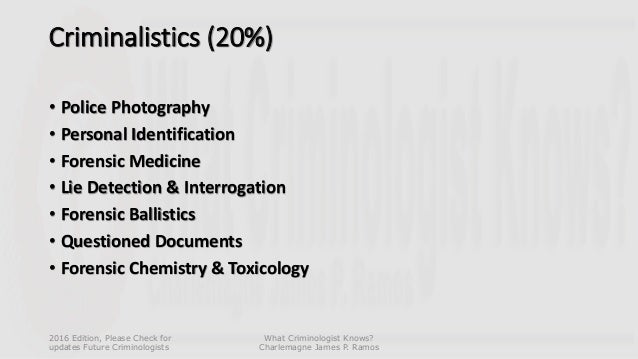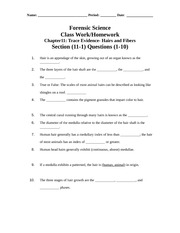Criminalistics Study Guide Answers
Question 3 3. Tamara's children have been coming home with bite marks on them after they've visited their father. Her ex-husband insists that other children at their daycare are biting them. The director at the daycare said that's not true.
The bite marks seem big to Tamara and she is afraid that her ex-husband's new girlfriend is biting them. Tamara has several friends that work in the forensics field.
One of them tells her she knows a co-worker that can determine if the bite marks are from children or an adult. What does the co-worker specialize in?. Forensic psychology. Forensic odontology. Forensic accounting. Forensic pathology. Question 22 22.
A white powder was found on the coffee table at a crime scene. Detectives think it is a controlled substance and the crime may be linked to local drug trafficking. Is there any way to determine if the powder is actually a controlled substance? Detectives just have to do field tests and rely on that information. The equipment found at forensic laboratories does not have the capability of analyzing substances such as this.
No, because it's not a clean sample. The forensic laboratory has the equipment needed to analyze substances that are believed to be controlled substances. Question 23 23.
Several shell casings were found at the scene of a double homicide. Can these be used in the forensic laboratory to determine who the perpetrator is?

Only the bullets taken out of human bodies can be used. It is possible because the forensic scientist can analyze the casings and compare them to casings used in other crimes and recorded in a database. Yes, but only if there are fingerprints on them.
The casings themselves won't help. The forensic scientist has to have the gun that was used.
Criminalist: Career Guide “Criminalist” is a broad term that includes several jobs within the forensic science field. Criminalists examine physical evidence to create links between scenes, victims, and offenders. Criminalists are sometimes referred to as lab techs or (CSI).
Criminalists work in labs in local, state, and federal law enforcement agencies throughout the United States. In rural areas, law enforcement agencies with fewer forensic resources may send evidence to a state crime lab for evaluation. Forensic technicians with experience may be promoted to supervisory roles.
Criminalists with experience and/or a master’s degree may advance to administrative positions. Career Description, Duties, and Common Tasks Criminalists execute a vareity of activities including:. Consulting with experts (DNA or medical experts, for example). Examining and analyzing crime scene evidence, including fingerprints, hair, fibers, skin, blood, dirt, spent ammunition casings, bullets, and insects.
Offering expert testimony in court. Using physical evidence to determine answers to the “who, what, where, when, and how” questions about specific crimes.
American Board Of Criminalistics Study Guide
Steps for Becoming a Criminalist The minimum education requirement for prospective forensic science technicians (including criminalists) is a high school diploma or equivalent. Many employers prefer a with concentrated coursework in biology, forensics, or crime scene investigation. However, there is a growing trend within state or federal agencies toward requiring a minimum of a master’s degree in the natural sciences.
Criminalists must also attend continuing training and coursework to stay current on investigation trends, procedures, and methods. The hiring process for criminalists will depend on the job, but the following steps can be used as a general guide:. Attend a degree program and/or gain experience in a related field. Apply for an open position as a criminalist.
Modern Biology Study Guide Answers
Successfully complete a physical examination, drug test, polygraph exam, and background investigation. Complete an interview. Get hired as a criminalist. Apply for certification from the by successfully passing a comprehensive exam.A degree may or may not be required, especially with substantial experience in the field.
Check the job posting for details. Check with your employer for their specific requirements. Criminalist Job Training After earning a bachelor’s or master’s degree in a related field, criminalists typically complete additional on-the-job training upon hire. Under the watchful eye of an experienced crime scene investigator, novices will get hands-on experience in collecting, documenting, and analyzing evidence. The specifics and length of training depend on the hiring organization. Other Helpful Skills and Experience Prospective forensic science technicians must be detail-oriented, possess strong communication skills, be prepared to testify in court when necessary, and have the ability to maintain a professional attitude in stressful situations. Candidates with law enforcement experience or those with a four-year or advanced degree in may have an advantage during the hiring process.
Possible Job Titles for This Career. Crime Scene Investigator. Forensic Science Technician. Criminalist Salary and Job Outlook The Bureau of Labor Statistics (BLS) estimates that forensic science technicians earned a median annual salary of $56,320 as of 2015; the top 10% earned more than $94,410 per year. 1 With increased emphasis being placed on forensic evidence in the conviction of offenders, career opportunities for criminalists are expected to increase. Jobs for forensic science technicians are expected to grow 27% from 2014 to 2024, according to the BLS, which is far faster than average for all occupations.
1 Related Careers Since a career as a criminalist interests you, you may also want to take a look at these other related jobs:. Frequently Asked Questions Question: Are internships helpful for being hired as a criminalist? The more experience a new criminalist has when looking for a position, the better. Completing an internship during college can provide students with valuable real-world experience, help them develop contacts in the professional community, and may even lead to a job offer upon graduation.
Question: What kind of hours do criminalists generally work? Answer: Forensic science technicians often work full-time and may be assigned to day, evening, or night shifts. Prospective criminalists should be willing to be on call, as they may be needed any time of the day or the night. Question: What are the typical working conditions for criminalists? Answer: Physical fitness is a must. Forensic scientists must be able to sit or stand, sometimes for hours at a time, while analyzing and documenting evidence. Criminalists must also have the flexibility to reach and bend frequently, as well as the strength to lift heavy items repetitively.
Question: Do criminalists work alone? Answer: While they may work independently, criminalists must also have strong people skills as they will also communicate with and work alongside law enforcement and other forensics experts as part of an investigative team. Additional Resources. – A professional organization whose members represent all careers in forensic science and is dedicated to advancing and promoting the field. – A professional association comprised of forensic science organizations. – A magazine that delves into the technology used in forensic science, offering resources, newsletters, and a training calendar.

– A professional publication that covers forensics and includes articles, videos, webinars, and resources for criminalists. References: 1. Bureau of Labor Statistics Occupational Outlook Handbook, Forensic Science Technicians.